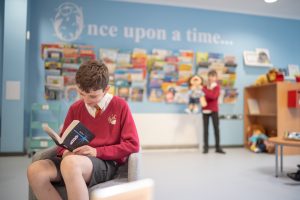English
Progression in Writing to Entertain
Progression in Writing to Inform
Intent
St. Gabriel’s English curriculum aims to foster a shared love of language by creating meaningful experiences using and responding to quality texts to ensure that children view reading, writing, grammar, speaking and listening as fundamental and interconnected expressions of human communication. We carefully select the texts we use to drive our curriculum ensuring that they offer a mirror for our children to see themselves reflected but also act as windows; allowing them to develop their broader understanding of the world and further their cultural capital.
Our English curriculum ensures all children are fluent, confident decoders and comprehending readers; catalysing their academic success. We also seek to ensure all children are imaginative, eloquent and skilful writers whose broad vocabulary and creative flair enable them to craft purposeful texts. Through opportunities for drama, debate and discussion, we support children in becoming confident, articulate speakers and responsive, analytical listeners; empowering them to communicate in tomorrow’s global world.
Implementation
English is taught daily as a distinct subject with additional reading lessons for each class. Each English unit is based around one of our core texts with children completing a mix of reading and writing activities within each block of learning. Key themes across these texts are revisited throughout a child’s learning journey to help them connect and secure their knowledge and understanding. These key themes are: Exploration and Home, Creativity and Innovation, Environment, Diverse Voices and Moral Characters.
Children are taught to write for a particular purpose either to inform or to entertain with exploratory learning completed to identify characteristics of different writing. There is a strong emphasis on empowering children to develop their own voice as writers through analysing other writers’ styles. Grammar knowledge and skills are taught in the context of these lessons so that children learn to apply them in their own writing. Across our curriculum, but especially in English, lessons are language rich and there is a strong focus on vocabulary with pupils encouraged to identify and explore unknown words, learn their definitions and apply them in their own speaking and writing. In Reading lessons, children are supported to read challenging texts often in extract form; allowing them to develop their decoding, fluency and comprehension skills.
Handwriting is taught in Early Years and Year 1 following our own scheme which carefully matches our SSP. When children in Year 2 are ready, they are taught to join their handwriting using our own scheme which builds on their previous learning. Spelling is taught through our SSP in Early Years and in Key Stage 1. In Key Stage 2, spelling is taught each week with regular opportunities for retrieval practise both at home and in class. These lessons follow a cyclical scheme which builds on previous learning and is driven by learning spelling rules.
Each class enjoys regular story time with teachers selecting texts to engage our pupils emotionally and broaden their experiences of literature. As well as a main School Library at the heart of our school, each classroom has a Class Library where quality texts are displayed, spotlighted and celebrated.
Impact
Our pupils love reading and writing. They are able to talk about their favourite authors and books they have enjoyed as a class and independently. Because of this love and skilful teaching, our pupils achieve well; exceeding National expectations. Three times a year, children are formally assessed in both Reading and Writing with their attainment moderated by subject leaders. Teachers also regularly assess their children’s attainment in reading through using a bench marking tool to ensure that the texts they are reading at home are carefully matched to their skill level.
Within lessons, assessment for learning strategies are employed to enable teachers to identify the strength of understanding of the children. Teachers use this information to make adaptations to their planning to meet the needs of the children. Teachers may also change the focus of learning during a lesson to ensure children are supported and challenged. Verbal feedback and written feedback is used to support children in understanding more about their progress. School leaders monitor pupil’s books termly and children’s views and understanding are ascertained through pupil surveys which are compared against national data.
Progression in Writing to Entertain
Progression in Writing to Inform





